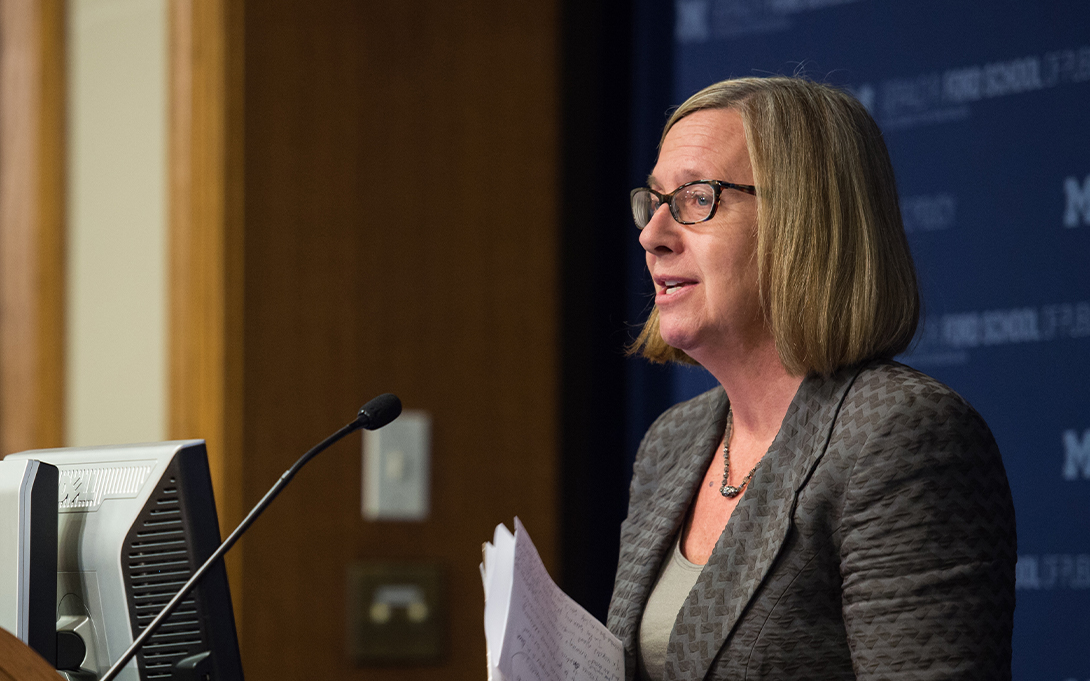
A distinguished group of Michigan public health experts has filed in several courts an Amicus Curiae brief defending Michigan Governor Gretchen Whitmer’s stay-at-home orders. Represented by lawyers from Kaplan Hecker & Fink LLP in New York City, the brief was first filed June 12 in U.S. District Court, Western District of Michigan, regarding two cases: Sotheby’s v. Whitmer, brought by individual businesses, and Mitchell v. Whitmer, initiated by Michigan GOP Congressman Paul Mitchell. The brief was also filed June 24 in the Michigan Court of Appeals in regard to the lawsuit brought against Governor Whitmer by the Michigan legislature.
Paula Lantz, associate dean for academic affairs and the James B. Hudak Professor of Health Policy at the Ford School was the lead writer. She says, “"Unfortunately, governmental public health responses to the coronavirus pandemic have become overly politicized. This brief presents facts about the virus and the scientific evidence behind the emergency orders Governor Whitmer put in place so that judges can better understand the importance and impact of her response to this public health crisis."
The brief states that the emergency orders put in place by Governor Whitmer have a strong scientific evidence base and have been used to control many other infectious disease epidemics including the Spanish flu and polio. The brief also presents disease modeling results that estimate that “by June 1, 2020 the difference between the actual number of COVID-19 cases in Michigan and the expected number without social distancing interventions is 28,000. This translates into an estimated 3,500 deaths from COVID-19 that were averted by June 1, 2020 because of the emergency orders.”
The brief continues, the University of Michigan COVID-19 modeling exercises estimate that “the epidemiologic curve of COVID-19 was indeed flattened such that the peak number of cases seen in April would likely have been 2.7 times the actual number experienced in Michigan without the emergency orders. In the same vein, absent Governor Whitmer’s executive orders, Michigan hospital systems would have exceeded their capacity for treating COVID-19 patients in mid- to late-April, leading to even more suffering and deaths due to COVID-19.”
The public health scientists also state that, because of the ability of the novel coronavirus to spread easily and fast, lifting the emergency measures all at once for the entire state or removing the Governor’s ability to quickly revise, refine or reimplement certain targeted measures if needed in the future will likely result in a resurgence of COVID-19 cases and deaths.
Oral arguments are expecte ion August.
Other amici include Matthew L. Boulton, Emily Martin, Abram L. Wagner, Marisa Eisenberg, Joseph Eisenberg from the School of Public Health, Howard Markel from Michigan Medicine, as well as Mona Hanna-Attisha and others from Michigan State University and other medical schools, health care institutions and foundations.
Paula Lantz is the associate dean for academic affairs and the James B. Hudak Professor of Health Policy at the Ford School. She also holds an appointment as professor of health management and policy in the School of Public Health. Lantz, a social demographer, studies the role of public policy in improving population health and reducing social disparities in health. Lantz is currently engaged in research regarding the potential for and challenges associated with using social impact bonds to fund public/private partnerships aimed at improving health in low-income populations, including Medicaid beneficiaries. An elected member of the National Academy of Social Insurance and the National Academy of Medicine, Lantz received an MA in sociology from Washington University, St. Louis, and an MS in epidemiology and PhD in sociology from the University of Wisconsin.
